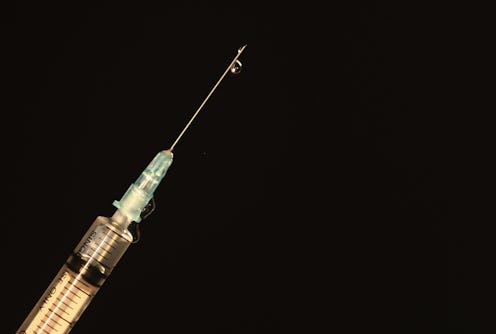News
Does This Constitute Cruel & Unusual Punishment?
Dennis McGuire, an Ohio convict executed yesterday with an untested lethal-injection cocktail took an "unsually long time" to die — about 24 minutes. Now, his apparently painful execution is sparking a new debate about capital punishment. The cocktail, a two-drug injection of midazolam (a sedative) and hydromorphone (a painkiller) didn't seem to go down smoothly: McGuire was reportedly "gasping and convulsing" for at least 10 minutes before he died, making "loud snorting noises" that could be indicative of "air hunger," a phenomenon that causes terror in subjects when they can't catch their breath. Now, McGuire's family says they plan to sue Ohio over what could constitute cruel and unusual punishment.
"He gasped deeply. It was kind of a rattling, guttural sound," said observer Alan Johnson. "There was kind of a snorting through his nose. A couple of times, he definitely appeared to be choking."
A hearing took place Thursday in a last-ditch attempt to halt the execution, a sentence given to McGuire for raping and killing a 22-year-old of a pregnant woman in 1994. McGuire's lawyer said that McGuire had sleep apnea, which would compound the effects of air hunger.
"McGuire will experience the agony and terror of air hunger as he struggles to breathe for five minutes after defendants intravenously inject him with the execution drugs," the inmate's attorneys said in a Monday court filing.
"Why it took 24 minutes, I really can't tell you," an anesthesiologist at Cleveland's University Hospitals Case Medical Center, Howard Nearman, said. "It just makes you wonder — what was given? What was the timing, and what were the doses?"
Supplies for lethal-injection executions are drying up across the United States — but why? Well, European companies — many of which are located in countries that don't support capital punishment — have stopped selling the drugs for use in executions as part of a boycott against the policy. The boycott started back in 2011, and now stockpiles of supplies are either expired, or have all been used up. As a result, prison systems, as in McGuire's case, are turning to untested concoctions out of desperation. As we reported in October:
Texas was stuck in a lurch after its supply of pentobarbital expired in September, and Georgia, California, South Dakota, Missouri, and Arkansas are all looking for alternatives. While Arkansas Department of Correction officials plan to revise their execution policy, Georgia is dealing with a lawsuit stemming from their refusal to name the compounding pharmacy that supplied the state after they ran out of an ‘official’ supply in March. (The plaintiffs contend that the drug, coming from an as-of-yet unknown source, could be unsafe.) Concerns are compounded by the fact that such pharmacies aren’t closely monitored by the FDA.
But do prisoners who have death sentences deserve to die pain-free? We have the "cruel and unusual punishment" clause, but apparently that allows leeway for what might constitute "reasonable suffering": "You're not entitled to a pain-free execution," assistant Ohio attorney general Thomas Madden said. As the New Republic reported:
A typical lethal injection death should be completed within seven minutes. Often that time is exceeded, sometimes by one or two hours, and throughout the execution the prisoner can be twitching, shaking, blinking, or appearing to try to speak.
Last week, in Oklahoma, 38-year-old Michael Lee Wilson, convicted of beating a convenience store manager to death in 1995, was executed in what appeared to be considerable distress. His last words, 20 seconds after the execution began, were: “I feel my whole body burning.” It begins to sound like a cruel or unusual punishment.
But when it comes to the untested nature of the drug and the cringing wait that took place after, while McGuire appeared to have suffered, "At this point, it is entirely premature to consider this execution protocol to be anything other than a failed, agonizing experiment," attorney Allen Bohnert said in a statement.
